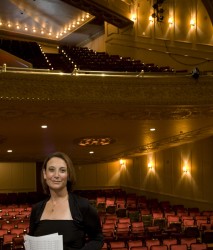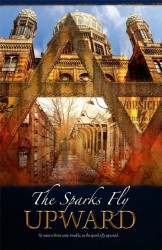 Cathy Lesser Mansfield during a rehearsal at Hoyt Sherman Place |
World premiere of Professor Mansfield’s opera set for Nov. 8
Cathy Lesser Mansfield epitomizes the Renaissance law professor.
She’s a nationally recognized expert on subprime and predatory lending who warned Congress about the impending credit crisis back in 2000 when she testified before the House Banking Committee.
Since then, she’s been advocating reforms in the mortgage industry through her publications and involvement with the National Association of Consumer Advocates. She also chairs the board of directors of Americans for Fairness in Lending, a nonprofit group working to raise awareness of abusive credit and lending practices and calling for re-regulation of the industry. She’s given lectures across the country and been interviewed on National Public Radio and quoted in the New York Times and Consumer Reports magazine.
While striving to orchestrate reform in the mortgage industry, Mansfield — a classically trained musician — also has been composing an opera about the Holocaust.
The world premiere of “The Sparks Fly Upward” will take place at Hoyt Sherman Place in Des Moines on Nov. 8 — the 70th anniversary of Kristallnacht — the Night of the Broken Glass when Nazi thugs moved through the cities of Germany, smashing the windows of Jewish homes and shops, burning synagogues and attacking Jews.

“The Sparks Fly Upward”tells a story of fear, faith and hope. The opera follows three German
families in Berlin — two Jewish and one Christian — through the
Holocaust, beginning in the autumn of 1938.
The story is told completely through music and lyrics,
and was researched, written and composed by Mansfield. The Cleveland
native studied at the Cincinnati Conservatory of Music before
transferring to New York University to pursue a career in law while
maintaining her interest in music.
Mansfield’s opera is woven from the stories of those who
experienced the Holocaust. Her extensive research took her to the U.S.
Holocaust Memorial Museum in Washington, D.C., the Leo Baeck Institute
in New York, the Jewish Museum and the Centrum Judaicum in Berlin and
to countless unpublished biographies of Holocaust survivors,
contemporaneous news accounts and books.
“I decided that it was very important that the piece be
historically accurate,” Mansfield said, “so it could memorialize what
happened, educate the public and oppose the revisionist historians who
claim the Holocaust never happened. My ultimate dream is to have the
opera performed widely, serving to educate and combat hate and bigotry
of all sorts.”
The world premiere will feature:
•
A talented cast that includes Drake music faculty professors Leanne
Freeman-Miller and Christine Blanner along with several Drake students
• A 37-piece orchestra under the direction of Des Moines Symphony Maestro Joseph Giunta
• Hundreds of historical images from the archives of the United States Holocaust Memorial Museum
• Members of the Des Moines Choral Society portraying citizens of Berlin
Directing
the production will be Timothy X. Troy, chair of the Department of
Theater Arts at Lawrence University in Appleton, Wis. Troy holds a
Master of Fine Arts in Theatre Arts/Directing from the University of
Iowa and has directed numerous plays and operas, including “La Boheme,”
“La Traviata” and “The Magic Flute.”
“The Sparks Fly Upward” is being presented by The Sparks
Fly Upward Foundation. The mission of this nonprofit group is to
educate people about the Holocaust, genocide and tolerance through
theatrical productions, ancillary educational displays and accompanying
materials, while paying tribute to the victims and heroes of the
Holocaust.
“The
Sparks Fly Upward” has received grant funding from the Greater Des
Moines Community Foundation, Humanities Iowa, Iowa Arts Council and the
Jewish Federation of Greater Des Moines. Numerous private donations
have been made as well.
Mansfield is on sabbatical this year. She’s devoting
most of the fall semester to managing the myriad details involved in
bringing “The Sparks Fly Upward” to the stage.
During the spring semester, she’ll return her attention
to subprime lending. She plans to conduct research in a Cleveland
neighborhood plagued by real estate foreclosures to determine what
might have happened there under a different set of lending regulations.

